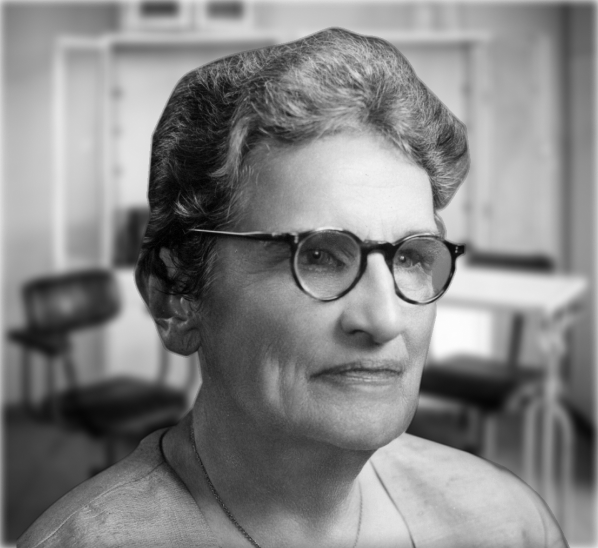- For 38 years GENEVIEVE CAULFIELD has befriended the blind in Japan, then Thailand and now in Vietnam, sharing with all she met the deep conviction of mans brotherhood and the “kingdom within” which led her across the sea.
- She decided at the age of 17 to contribute to international understanding by learning to know the Japanese while helping their blind.
- An invitation from the Government of Vietnam led to her most recent effort for the blind; the opening of an elementary school for the sightless in Saigon in 1958. It is now being enlarged to include a rehabilitation center for boys.
- The RMAF Board of Trustees recognizes her international citizenship and guidance to full and useful lives of those in other lands afflicted like herself.
For 38 years GENEVIEVE CAULFIELD has befriended the blind in Japan, then Thailand and now in Vietnam, sharing with all she met the deep conviction of man’s brotherhood and the “kingdom within” which led her across the sea.
Blind from infancy, she taught herself to live like other people, to be independent and useful. Prompted by an example of prejudice stemming from ignorance of another people’s way of life, she decided at the age of 17 to contribute to international understanding by learning to know the Japanese while helping their blind.
For 15 years she prepared for this undertaking, surmounting countless obstacles that would have daunted a less determined voyager. Qualifying as a teacher of English, she did practice teaching of the blind, proved she could earn a living and move about alone.
Arriving in Japan in 1923, she first lived with Japanese families to learn their customs and language. Supporting herself by teaching English, she also trained blind people to read Braille. After the close of World War II, she returned to Japan to help school the adult blind and other physically handicapped.
When she learned that those without sight in Thailand were considered useless, she spared no effort until there had been created a Bangkok School for the Blind. Financed partly from her own savings when it was opened in 1938, the School now is well-established and has won regular government and private support. Refusing repatriation, she kept classes going throughout the war and now gives vocational training and helps pupils find suitable work.
An invitation from the Government of Vietnam led to her most recent effort for the blind; the opening of an elementary school for the sightless in Saigon in 1958. It is now being enlarged to include a rehabilitation center for boys.
Over the years she has made periodic lecture tours in the United States, sharing with her countrymen the understanding that is the fruit of affectionate labors. Now at the age of 73 a commuter between three Asian countries, she continues to support herself by teaching English, while working with the blind.
In electing GENEVIEVE CAULFIELD to receive the 1961 Ramon Magsaysay Award for International Understanding, the Board of Trustees recognizes her international citizenship and guidance to full and useful lives of those in other lands afflicted like herself.
During my rather long life, I have had many surprises, but I can say with truth that I have never been so utterly astonished as when I received the telegram telling me that I had been selected for the Ramon Magsaysay Award.
My first reaction was to take a quick look backward at my modest accomplishments, and to wonder why the people who have really done all sorts of things in Asia had not been chosen instead of me. But even though I knew my unworthiness, I was filled with deep satisfaction that I, even I, was to receive the Magsaysay Award.
From the end of the war, I followed with deepest admiration the determined and wisely directed struggle of your great President against the forces of disruption and subversion which were threatening to take over your country. His outstanding leadership, not only in Asia, but in the entire free world encouraged and inspired those of us who were looking forward to a better world after the ravages of war. Then came the news of his untimely death. To me, as to many others, it was a personal loss as well as a blow to the cause of freedom.
You can imagine, therefore, how happy I am to know that, from now on, my name will in an humble way be associated with that of this outstanding statesman and truly great patriot.
I need not tell you that I regard this Award as a trust, to be used in the cause of international understanding, and to help blind people here in Asia to assume their rightful place in the world that needs them. I do not look upon it as an award to me, but to all those in Japan, Thailand and Vietnam, without whose help and understanding I could have done nothing.
Thank you once again, and be assured that this Award is, and will continue to be, a stimulus for me to put forth every possible effort to work for international understanding and for the welfare of the blind, as long as Almighty God gives me life and strength.

